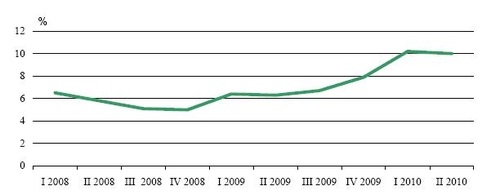Unemployment Push for Reforms
In the end of August The National Statistical Institute (NSI) released the results from the observation of the working force for the second quarter of 2010. The appraisals show that for that period the employed at the age of 15 or more are 3, 072.1 thousand (47% of the population), which is 6.9% more in comparison with the same period in 2009. The employed in the private sector are 72.6% and more than half of all employed in the economy works in the sector of services, followed by the workers in the industry (33.6%) and agriculture and forestry (7.3%).
At the same time the unemployed in the country are 342.2 thousands and the unemployment rate – 10%. Compared to the same period in 2009, the unemployment has risen with 3.7% or 120 000 people.
Quarter unemployment rate

Source: NSI
Maybe it is not surprising that the unemployment in the country continues to stay at high levels, though in comparison with the first quarter the data for the second quarter shows a slight decrease. The main reason for this is the seasonal employment. The expectations of IME are that this trend will turn round and in the end of the year the unemployment in the country will raise. The increase will be determined by two groups of factors: the fading effect of the seasonal employment and the reaction of the labour market to the crisis, which appears with a one-year lag, so the peak of the unemployment will be during the last quarter of the year, if we accept that the trough was in the end of the last year. And yet the rate will not exceed 12% but it will keep high values because of the reduced economic activity and the lack of substantial political commitment for improving the business climate.
It is clear that the unemployment in Bulgaria is high because of the crisis but its size could be considerably reduced with a right policy or at least with the lack of a wrong one. The actions which will lead to an immediate rise of the employment in the country are:
- reducing the labour taxing – reducing the insurances will result in a rapid and solid boost of the employment in Bulgaria. The effect for the real sector will be displayed in favourable impact on the investment decisions and activity expansion. Similar to the reduction of the flat tax, the cut of the insurances will provide a better tax collecting, insurance on the real income and a bigger part of the legal labour market.
- removing the minimum salary – the existence of a minimum salary determined through the administration is one of the most discriminating, or even the most discriminating, regulation of the labour market in respect of low qualified workers. All of them, whose added value is lower, remain unemployed or are hired in the informal economy. A great amount of the discouraged in the economy will fall into exactly in these groups. For a year their number has increased with nearly 50 000 people as a response to the cut and reduction of the salaries in the real sector.
- reducing the regulations for hiring and firing workers – the procedures for hiring and firing working force in Bulgaria are still quite tough and do not allow any flexibility for the business in the human resources. The negative effect is felt most strongly in the dismissing process, which directly affects the decisions for staff increase. The most damaged are the youth, which might be hired rarely if the expenses for their dismissal are too high for the employers, so the unproved specialists without work experience will not be able to hedge the risk for their hiring. From the second quarter of 2009 to the second quarter of 2010 the number of unemployed youth between the age of 15 and 24 has risen from 15 000 to 58 000 and the rate of unemployment of this group has reached 21.2% after an increase of 6.6% for the same period.
This is only part of the measures for reducing the regulations of the labour market which could result immediately in raising the employment and reduce the negative effects of the crisis on the citizens, the business and the state. The accomplishment of the urgent health, pension and educational reforms will have a greater and quicker effect. The government should accept that if policy-makers do not act radically in these directions, a long time after the main item of the budget will be the social expenditures and the labour market will never be able to function at its optimum.


